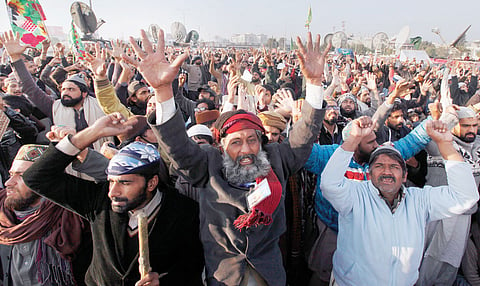Law Minister Zahid Hamid resigns after three-week protest by religious parties
Most analysts are questioning the government’s logic in delaying the action

Islamabad: Pakistan’s Law Minister, Zahid Hamid, resigned on Monday under pressure following a three-week siege of Islamabad and countrywide protests over an alleged revision on the blasphemy law.
The decision came in the wake of protests across the country following Saturday’s crackdown by the police on an Islamabad sit-in staged by Tehreek-e-Labbaik.
“I was not directly responsible for the introduction of the controversial amendment to the Finality of Prophethood declaration for electoral candidates,” said Hamid said. “In order to restore peace in the country, I have decided to step down from my position.”
Zahid Hamid tendered his resignation after his meeting with Punjab Chief Minister Shahbaz Sharif, which was approved by Prime Minister Shahid Khaqan Abbasi.
For weeks, Islamists have been demanding Hamid’s resignation because of an alleged attempt to change the wording of the oath relating to blasphemy law in the Elections Act 2017. However, the government soon reverted to the original law, calling it a clerical error.
Under pressure to appease the protesters, Hamid also released a video that was shared on social media in which he read the oath and said that he loved the Prophet (PBUH) “from the depth of my heart,” adding that he and his family were “prepared to lay down our lives for the honour and sanctity” of Islam’s holy Prophet.
The law minister is concerned about his safety as his ancestral home in Pasrur also came under attack from protesters on Saturday.
Reaction and expert views
The resignation of the Law Minister was the primary demand of a few hundred Islamists protesting in Faizabad, near Islamabad. The government initially ignored the severity of the issue and finally caved in after 22 days and the security operation that was suspended in few hours and reportedly killed six and injured 200 others.
Most analysts are questioning the government’s logic in delaying the action when they had to give in to the demands.
Had the government listened to the protesters earlier, the situation would not become violent and innocent lives could be saved, Sheikh Rasheed, leader of the opposition Awami Muslim League, said.
Abdul Manan, a member of Pakistan Tehreek-e-Insaf (PTI), said: “The resignation of Law Minister Zahid Hamid could have happened much earlier to diffuse the crisis. The delay in obtaining it resulted in great suffering for the people, destruction of public and private property and regretful loss of precious lives.”
A political commentator, Mubasher Lucman, wondered: “Why Zahid Hamid could not resign few days back? Why some people had to lose their precious lives and the country had to come to a standstill?”
Meanwhile, many experts are criticising the government’s reaction, emphasising that the resignation of the minister has smeared government’s reputation and challenged its power.
Senior analyst Zahid Hussain said that it is a “sad day when the state surrendered to the extremists. Now there is no stopping [them]”.
Maham Ali, a commentator, echoed his sentiment: “[It is a] sad day for Pakistan when a law minister is forced to resign to appease a mob.”
Political analyst Hasan Askari believes “giving in to the group’s demands has hit the government’s reputation and credibility”. He added that the protest has made bolstered the new religious group which is going to contest the next election.
Pakistani analysts are particularly critical of the way the government managed the whole situation, turning it into a disaster.
Ayaz Amir, senior analyst, said “The government’s judgement in delayed action and mismanagement of the crisis has exposed government’s incompetence to resolve issues.”
Security and political analyst Imtiaz Gul says that the security operation was conducted without proper planning. “The state’s delay allowed the protesters to make plans for a counter-protest across the country. This is why countrywide protests were witnessed after the operation began.”
Criticising the incompetence of the ruling government, PTI spokesman Fawad Chaudhry, said: “The current crisis that gripped the whole county has proved that government has lost all political authority.”
Analyst Brig Haris Nawaz, said: “Poor planning and weak governance of the political power compelled [the] Pakistan Army to step forward to diffuse tension and prevail peace in the country.”
Sign up for the Daily Briefing
Get the latest news and updates straight to your inbox



